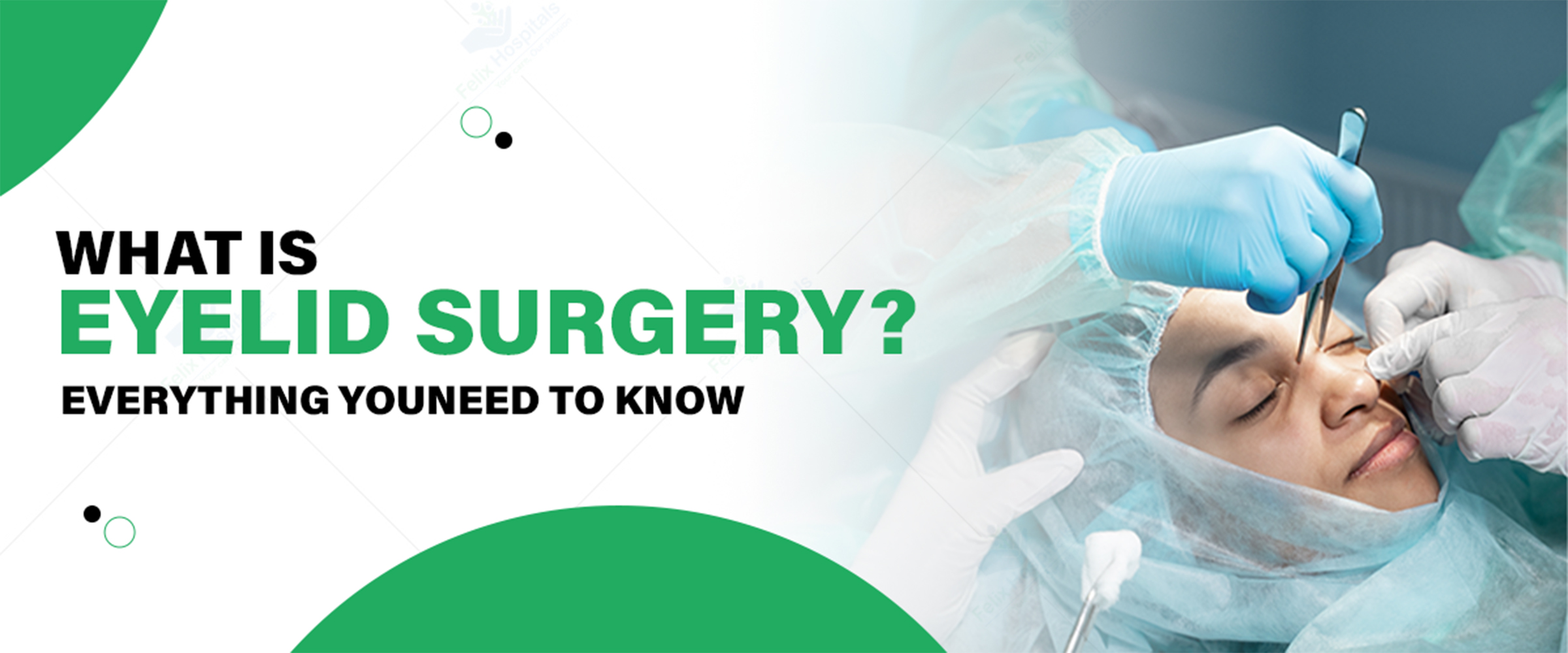
Subscribe to our

Eyelid surgery, medically known as blepharoplasty, is a transformative cosmetic and functional procedure designed to enhance the appearance of the eyes and address various eyelid-related concerns. As one of the most sought-after surgeries globally, eyelid surgery rejuvenates the area around the eyes, resulting in a more youthful and refreshed look. Beyond aesthetics, it also offers functional benefits by improving vision obstructed by drooping eyelids. For those seeking expert care, a leading plastic surgery hospital renowned for its exceptional services is an excellent choice for such advanced procedures.
Schedule your consultation with a skilled eyelid surgery specialist today by calling +91 9667064100.
Eyelid surgery, or blepharoplasty, is a surgical procedure aimed at correcting defects, deformities, and disfigurations of the eyelids while improving their aesthetic appeal. It involves the removal or repositioning of excess skin, fat, and muscle to restore a smoother and more youthful appearance.
Upper Eyelid Surgery: Focuses on removing excess skin and fat from the upper eyelids to improve appearance or functionality.
Lower Eyelid Surgery: Targets puffiness, dark circles, and wrinkles under the eyes.
Double Eyelid Surgery: Commonly performed to create a defined eyelid crease, often sought after in East Asian populations.
Droopy or sagging upper eyelids (ptosis).
Puffiness and bags under the eyes.
Wrinkles and fine lines around the eyes.
Impaired vision due to excessive eyelid skin.
Eyelid surgery enhances the overall facial appearance by eliminating signs of aging such as drooping skin, puffiness, and wrinkles. This leads to a rejuvenated and youthful look that boosts confidence.
For many, sagging eyelids are more than a cosmetic concern; they can obstruct vision. Eyelid surgery improves functionality, allowing for better sight and reduced eye strain.
The results of eyelid surgery often lead to enhanced self-esteem and greater satisfaction with one’s appearance. Feeling confident in your look can positively impact various aspects of life.
Consult with a certified surgeon to evaluate your needs and medical history.
Pre-operative tests to ensure you’re fit for surgery.
Avoidance of certain medications, smoking, and alcohol before the procedure.
Anesthesia: Administered to ensure comfort during the surgery. Options include local anesthesia with sedation or general anesthesia.
Incision: Small incisions are made along the natural creases of the eyelids to minimize visible scarring.
Tissue Adjustment: Excess skin, fat, and muscle are removed or repositioned.
Closure: The incisions are carefully sutured to achieve natural-looking results.
Mild swelling, bruising, and discomfort around the eyes.
Blurred vision and sensitivity to light in the initial days.
Use prescribed medications and cold compresses to reduce swelling.
Avoid strenuous activities, smoking, and makeup for a few weeks.
Protect your eyes from direct sunlight with sunglasses.
Most patients can resume normal activities within 1-2 weeks, although complete recovery may take several weeks. Follow-up appointments are crucial to monitor healing progress.
While eyelid surgery is generally safe, certain risks exist, such as:
Temporary swelling and bruising.
Dry eyes or irritation.
Difficulty closing eyes fully (temporary in most cases).
Scarring or asymmetry (rare with skilled surgeons).
For a successful outcome, it is essential to select an experienced, board-certified surgeon. At Felix Hospital, Dr. Pragya Priya is a highly skilled plastic surgeon renowned for her expertise in blepharoplasty and other cosmetic procedures. With a patient-centric approach and advanced techniques, Dr. Priya ensures safe and satisfactory results for all her patients.
Discover how eyelid surgery can enhance your confidence and quality of life. Book an appointment with an expert plastic surgeon.
Eyelid surgery is a remarkable procedure that offers both cosmetic and functional benefits, transforming not just appearances but also lives. Addressing sagging skin, puffiness, and vision impairments, it paves the way for enhanced confidence and improved quality of life. If you’re considering eyelid surgery, consult the expert surgeons at Felix Hospitals in Noida, to explore your options and embark on your journey toward a refreshed and vibrant look.
1. Is eyelid surgery painful?
Ans. Eyelid surgery is generally not painful as it is performed under local or general anesthesia. During recovery, patients may experience mild discomfort or tightness around the eyes, which is manageable with prescribed pain medication.
2. How long do the results last?
Ans. The results of eyelid surgery are long-lasting. Upper eyelid surgery results can last 5-7 years or more, while lower eyelid surgery often provides permanent improvements. However, natural aging may gradually impact appearance over time.
3. Can eyelid surgery correct asymmetry?
Ans. Yes, eyelid surgery can address asymmetry caused by drooping or uneven eyelids, creating a more balanced and symmetrical appearance. Your surgeon will evaluate your unique anatomy to achieve the best results.
4. What age is ideal for this procedure?
Ans. While there’s no “ideal” age, most candidates are in their 30s or older, seeking to correct age-related changes. However, younger individuals with hereditary issues like puffy eyelids or asymmetry may consider this surgery.
5. Will there be visible scars after eyelid surgery?
Ans. Eyelid surgery incisions are carefully placed along natural creases, making scars virtually unnoticeable once healed. Proper aftercare and following the surgeon’s guidelines further minimize visible scarring.
6. Can eyelid surgery improve vision?
Ans. Yes, for individuals with severely drooping eyelids that obstruct vision, eyelid surgery can improve peripheral vision by lifting the excess skin. This is often categorized as a functional rather than a cosmetic benefit.
7. How soon can I return to daily activities after eyelid surgery?
Ans. Most patients can resume light activities within a week. Full recovery, including the resolution of swelling and bruising, may take 2-4 weeks. It’s essential to follow post-operative care instructions to ensure optimal healing.